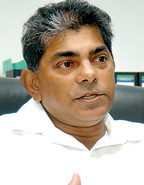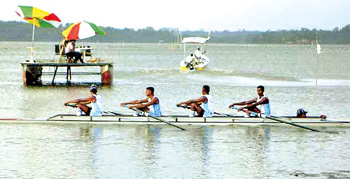Though rowing as a sport was much reserved to the members of elite society in Sri Lanka historical evidence have revealed that the sport was inherited by traditional paddle boating which is unique in the Asian region. Rowing in Sri Lanka will celebrate its 150th anniversary in 2014.
During the past decade few individuals who were keen to see rowing spread out throughout the country made an attempt to change course for better but little were they successful. The sport in Sri Lanka is governed by the Amateur Rowing Association which is commonly known as ARASL and its present president, Rohan Fernando -- one of the pioneers in being innovative to make a fresh headway.
“Attempts were made constantly during the recent times to break free from our location in the Beira Lake to a new place in Bolgoda where it gave more provisions to meet the international standards. Eventually we took the bold decision to move from our comfortable, traditional and familiar cocoon to more open space. But mind you the decision was approved by a majority of a single vote. This shows the resistance to change but today the reality is visible,” said Fernando with glee.
 |
| Rohan Fernando |
It was three years ago to be precise rowing was moved to Bolgoda Lake in Moratuwa where the oarsmen were able to taste the international touch. Earlier at Beira, the maximum distance of a race was confined to 1000 metres. But during the past three years athletes are able to race a full distance of 2000 metres which is the standard length in a world championship rowing event.
With the adoption of requirements needed to meet international standards, rowing in Sri Lanka experienced a vast development. Until recently the sport was restricted to only a few crews such as the Colombo Rowing Club, Royal College, S. Thomas’ College, St. Joseph’s College, Universities of Colombo and Moratuwa and a couple of girls’ schools. Today nearly 20 crews can be seen indulged in the sport signifying an encouraging pathway in rowing.
“This is what we anticipated. By shifting to Bolgoda our intention was to break the barriers of difference of class, affordability and accessibility. Earlier we could not think of matching up international standards as we did not have the required course specifications. Various equalisations which were not accountable practically were also done pertaining to speed and other aspects. But we are now at a better position,” added Fernando.
According to Fernando who is a former S. Thomas’ and national oarsman the requirements needed for rowing in the aspects of technology, strategy, mental make-up and skills differ from each location. But when preparations are being done on an internationally acclaimed course the athletes find it very viable to take up any global challenge. Fernando indicated that the ARASL is in an attempt in developing a national rowing squad for the first time in the history of the sport.
“It’s building up gradually. Our target is to include 100 athletes in two years and presently there are nearly 40 who attend practices. What we are attempting through this is to break the seven minute timing barrier in the 2000 metres course. Earlier when we conducted regattas on the 1000 metres course the full timing was not so impressive.
Our athletes took more than eight minutes to complete the course. Internationally something below six minutes is really remarkable. We are at the moment hovering within the seven minute range but in the Asian Games 2010 our athletes clocked 6.56 which is really outstanding. We have a target and are gradually getting there,” said Fernando while admiring the keenness of the oarsmen from the Armed Forces crews.
Introducing rowing into schools is among the plans of ARASL who are keen to take the sport to the outstations of the country. Apart from Beira and Bolgoda, Fernando revealed that waters of Hambantota, Wakarai and Nuwara Eliya are being considered for rowing while being promoted island wide. He also insisted on the need to form a separate governing body for schools if the sport is to reach the four corners of the country.
“There is lot of things happening in rowing presently. This is a fascinating sport which supports one’s character build up and physical fitness. Rowing is an aerobic sport where almost all parts of the body and the breathing pattern is interconnected while in progress. Injuries are very rare in this sport. As the governing body of rowing, the responsibility of ARASL is to promote the sport. The country and the authorities must realize that rowing has the credentials to be identified as a national sport. We are at the moment convincing the authorities to think on that. Rowing is a passion and our prime object is to preserve its values as a sport that can be indulged by all,” concluded Fernando.
|



